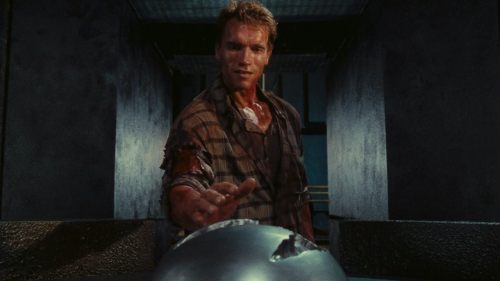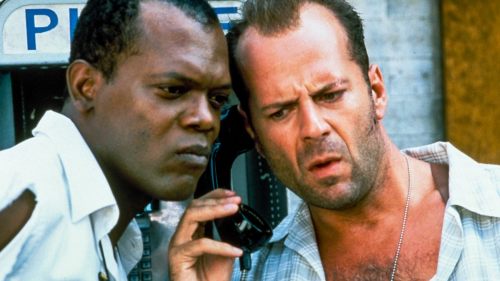American Gladiators: THE RUNNING MAN At 30
Stephen King's always maintained that Richard Bachman was him, sans a conscience. Bachman's debut novel Rage ('77) depicted a school shooting so accurately the author had the novel fall out of print following the rise of mirroring incidents in the '80s, '90s and aughts. The Long Walk ('79) takes place in a totalitarian alternate history of the United States (a result of the Germans winning their World War) whose most popular sport involves a group of teenage boys embarking on a lengthy journey by foot, getting shot down by soldiers should they not be able to keep pace. Roadwork ('81) follows a grief-stricken man who engages in terrorist acts against the construction company paving a road that will run right through his already broken home. These were books involving human evil caused by emotional trauma, often taking place inside a dictatorship.
When asked why he invented the nom de plum, King always responded that it was an experiment to see if his steadily increasing success was actually due to talent or sheer luck. Upon first publication, Thinner ('84) - where a cruel fat man endures a gypsy curse that causes him to lose weight at an exponential rate - sold 28,000 copies. Once Bachman was forcibly outed as King's other half, the novel moved ten times that amount. In The Dark Half ('89), King's fictional stand-in, Thad Beaumont, has to kill off his symbiotic parasite of a pseudonym named Richard Stark - a vicious, black-hearted cynic through whom Thad exorcises his darkest feelings into graphic, visceral pulp - after being blackmailed into revealing their "relationship". You do the math (and King won't deny it).
The Running Man ('83) is arguably the gem of The Bachman Books (which were collected into the eponymous omnibus in '85). Like The Long Walk, it takes place in another America ruled by an oppressive, censoring, violent autocracy, where television bloodsport receives the highest ratings. The game show from which the novel takes its name sees contestant Ben Richards try to outrun a set of hitmen (called "Hunters") struggling to prevent him from earning $100/hour as he evades getting killed or captured. Executive producer and host Dan Killian narrates the proceedings for the audience at home, as Richards gathers every dollar to try and pay for his sickly daughter's medicine, and to keep his wife from turning tricks to help support the family. It ends with Richards hijacking a plane and crashing it into the side of a skyscraper where Killian's network office is located, eerily predating the 9/11 attacks on the Twin Towers. The final line reads: "...and it rained fire twenty blocks away."
In the '87 film adaptation, director Paul Michael Glaser (Band of the Hand ['86]) changes Richards from being a blue collar everyman, to a goverment employed pilot (played by Arnold Schwarzenegger, at the height of his freakish physical prowess) who refuses to carry out an attack on a crowd of unarmed impovershed protestors. Control of the helicopter is wrestled from his paws, the ensuing massacre pinned on him by the state. For eighteen months, Richards is detained at a labor camp, before breaking out with two members of the underground revolution, Weiss (Marvin McIntyre) and Laughlin (Yaphet Kotto). Ben tries to find his brother, only to discover he's been taken for "re-education", his sibling's apartment now occupied by pretty games employee, Amber Mendez (Maria Conchita Alonso).
The main element Glaser doesn't change is Killian (outside of his first name, which is now Damon for whatever reason). Portrayed with carnival barker glee by Richard Dawson (Family Feud), this predatory hawk is a showbiz archetype, barking at assistants and throwing his weight around up the chain of power (including a demand to speak with "the President's [talent] agent" at one point). Once he spots the Godlike phsyical speciman that is Ben Richards, he demands the escape artist be caught and used as a contestant for his "Stalkers" (hulking WWE-style personalities who all kill their prey in very particular fashions) to hunt; bets placed on which ghoulish TV star will draw first blood, and which of the contestants will be their initial victim. Bachman's basically been re-worked for the '80s action era, as this neon-slathered Thunderdome - four-hundred sqare blocks of a deserted urban arena decimated by natural disaster - is broadcast across the country.
Arnold is a movie star in The Running Man, not so much delivering a performance as he is leaning into the B-Movie marquee persona he'd been cultivating throughout the first half of the decade. Only Arnold's Ben Richards is no longer your downtrodden next door neighbor, but a beast ready to be unleashed against the "Stalkers", just as much as he's there to be hunted by them. God bless Marvin McIntyre and Yaphet Kotto (whose Weiss and Laughlin are forced to participate in the game alongside Richards), as they don brightly colored spandex on their lumpy, relatable bodies, basking in normalcy when situated next to Arnold's Adonis form. The Running Man is easily one of the ultimate "Arnie" movies, as he even recycles his trademark "I'll be back" to a somewhat befuddled Dawson.
Yet screenwriter Steven E. de Souza (Commando ['85]) isn't fine simply letting this version of The Running Man exist as a mere star vehicle, and leans into the satirical elements (which now feel oddly prescient thirty years on). An Entertainment Division of the United States Department of Justice and contestants being assigned court-appointed talent representation is unnerving during an era where we have a President whose Tweets could now ignite a nuclear war, and who decries reputable outlets as manufacturers of #fakenews. Tapes of Richards' participation in that show of military force (which earned him the nickname "The Butcher of Bakersfield") have been altered to paint the pilot as the mastermind, and Amber is entered as a last second contestant to the game, after trying to uncover the original recording of the incident in the network's archives. This is a propoganda state, in which celebrities hold control over the fascistic regime. All too familiar in '17.
As insane as Arnold is, the Stalkers sent to slay him are just as audaciously supercharged. Sub-Zero is a massive Japanese man in hockey pads (Professor Toru Tanaka), chasing the contestants around an ice rink with a razor sharp goalie stick. Buzzsaw (Gus Rethwisch) is a barrel-chested monstrosity, wielding Leatherface's favorite gas-powered tool of destruction. Dynamo (Erland van Lidth) sings opera and shoots electricity from his overlit Christmas tree of a suit. Fireball (Jim Brown) has a jet back and a flamethrower. Captain Freedom (Jesse "The Body" Ventura) really wants to do nothing more than kill another man with his bare hands. The crowd cheers these maniacs on, picking favorites and undoubtedly owning trading cards they've stuck on the fridge, as these bloodthirsty personalities provide distraction from the fact that they live under oppressive rulers who monitor their every movement and feed them fabrications with each broadcast.
The Running Man often feels like John Carpenter on steroids, incredibly pumped up and owning a cartoonishly colorful palette that's never less than eye-popping (cinematographer Thomas Del Ruth lenses the hell out of this neon wasteland). Harold Faltermeyer and Vassal Benford's synth score even mirrors the notes of the lo-fi mastermind who brought King's Christine ('83) to gorgeous life before the book was even published. While faithful only in central conceit, Glaser's picture still retains the venemous spite that set Bachman's work apart from King's (the source is even credited to the pseudonym in the final cut). Glaser's Running Man is a wild, subversive oddity, masquerading as just another Arnold movie (while totally owning a quintessential Schwarzenegger appearance), and proof that sometimes the most effective satire is packaged inside ostentatious, wacko pulp. We were never going to get Ben Richards going out in an act of aerial terrorism on screen, but Arnold choking a man on ice skates with barbed wire is a fine second prize.



